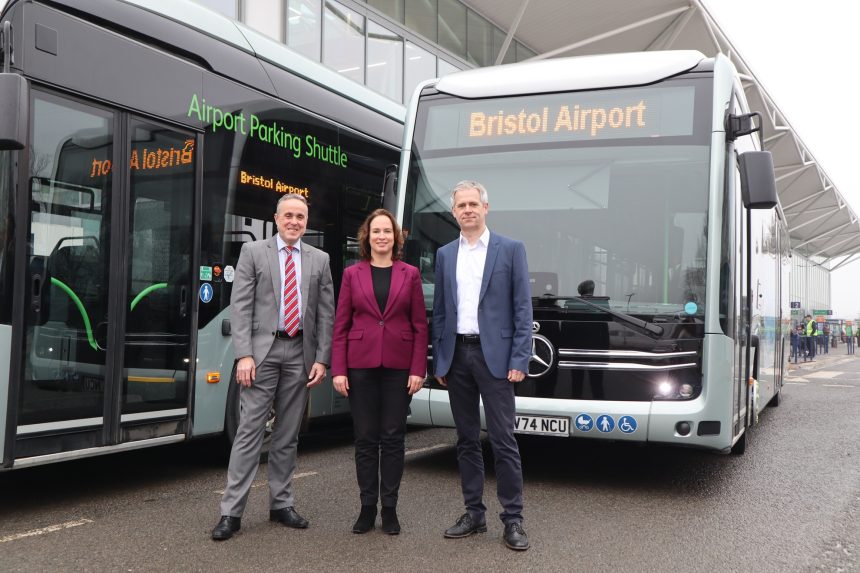Bristol Airport is among the first UK operators to place the Mercedes-Benz eCitaro battery-electric bus into service, with two in use on staff and passenger shuttle work. They maintain a longstanding relationship between the air travel hub and vehicle supplier Daimler Buses UK that the latter says is indicative of returning momentum behind the wider Citaro platform, in both diesel and zero-emission format.
Transdev Blazefield is another customer here with eCitaros in service. It has more due, and wider operator interest in the model is growing. Daimler Buses has taken longer than some other manufacturers to make battery-electric headway in bus, but that is no cause for concern.
In fact, it shows a pragmatic and sensible approach, says Daimler Buses UK CEO Dr Jens Heinemann, who highlights the UK business’s “commitment to providing the best possible infrastructure preparations and support for our customers.”
Electro-Mobility Manager Adrian Felton leads eCitaro sales here and he is now also responsible for work with diesel and mild hybrid Citaro models. Adrian thus effectively takes a bus commercial development manager role at Daimler Buses UK. Significant progress has been delivered since he joined the importer almost three years ago.
Rebuilding the Citaro platform’s presence here is the overarching call on Adrian’s time, and majoring on its status as a premium product is central to what Daimler Buses UK believes are strong ongoing prospects across the board. Bristol Airport is one of several customers that has taken or will take delivery of battery-electric buses from the importer this year.
eCitaro is a customisable battery-electric platform
An airport application is a good example of that premium positioning for the eCitaro. The two for Bristol Airport work alongside Citaros that run on HVO, providing landside services. That is a 24hr operation and it runs intensively.
Battery-electric power in buses is part of the airport’s wider net-zero strategy that calls for all vehicles across its wider fleet to be zero-emission by 2030.
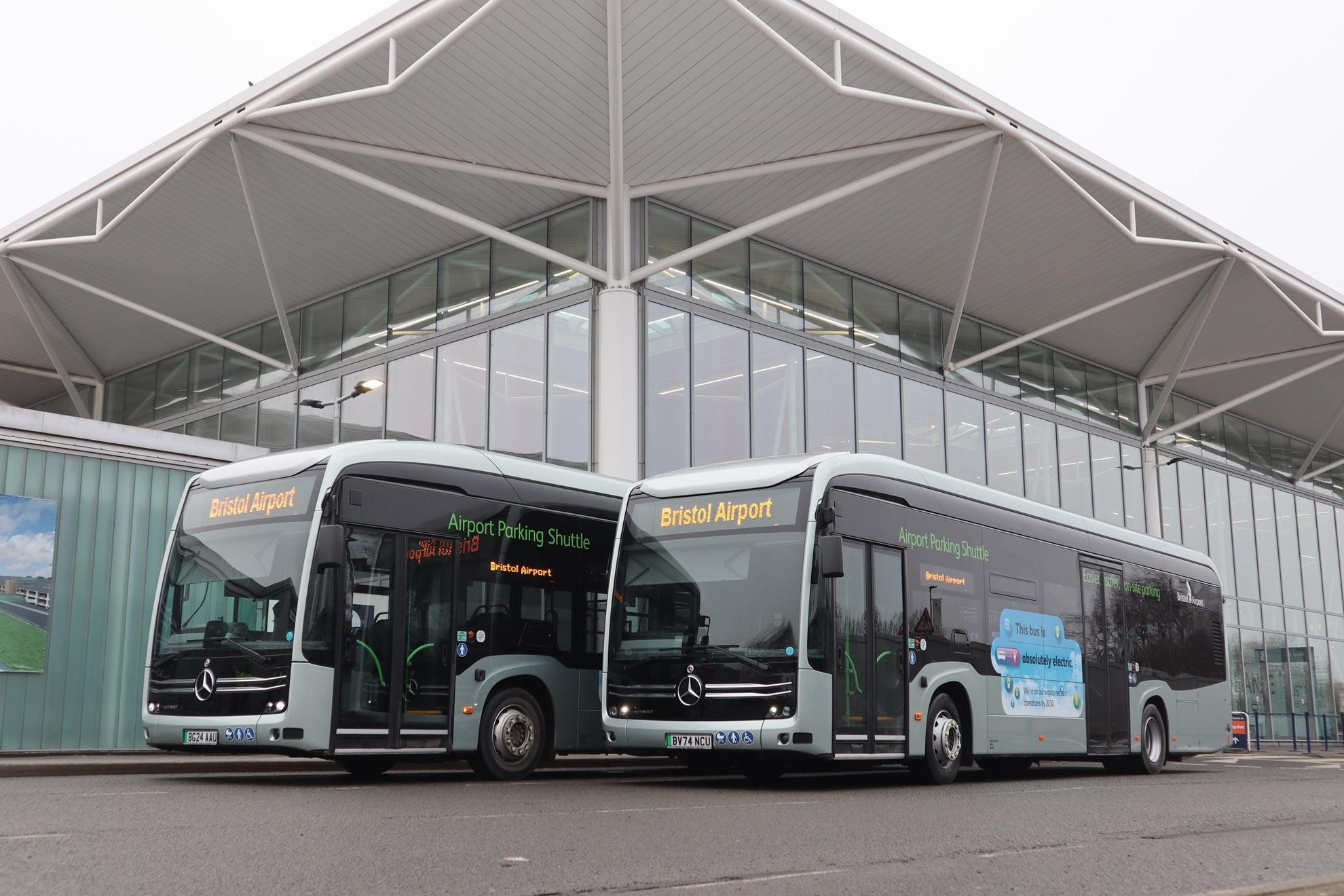
The eCitaro pair have been customised internally to suit the customer. They are the first two-door examples of the type to be delivered in the UK, although they may not remain unique in that respect for long, Adrian hints.
The internal arrangement is to a typical airport layout with a large luggage rack, although the latter is sized specific to Bristol Airport’s needs. Staff movements do not require such extensive baggage space.
Green is within the seat moquette, and it is also how the handrails are treated. Those include a design where a single pole is split into three separate uprights in the middle to maximise the number of travellers that can hold it. The fully flat gangway is cited by Adrian as important where capacity is paramount.
A 150kW plug-in charger supports the two buses. Because of their intensive use, they are only charged for relatively short periods during driver handovers or short breaks, says PCV Compliance Coordinator Paul Eccles. That suits the operating landscape, and sufficient power can be taken under such an arrangement.
Third-generation battery tech in use; fourth is coming
The Bristol Airport eCitaros have third-generation NMC batteries with a nominal 588kWh of capacity, 420kWh of which is usable. A fourth generation of that energy storage – NMC4 – is available in buses ordered now for delivery from 2026.
It promises a longer service life and higher energy density; an NMC3 battery pack has 98kWh but an NMC4 unit will have 111kWh. That couples to a higher proportion of capacity that can be used for propulsion.
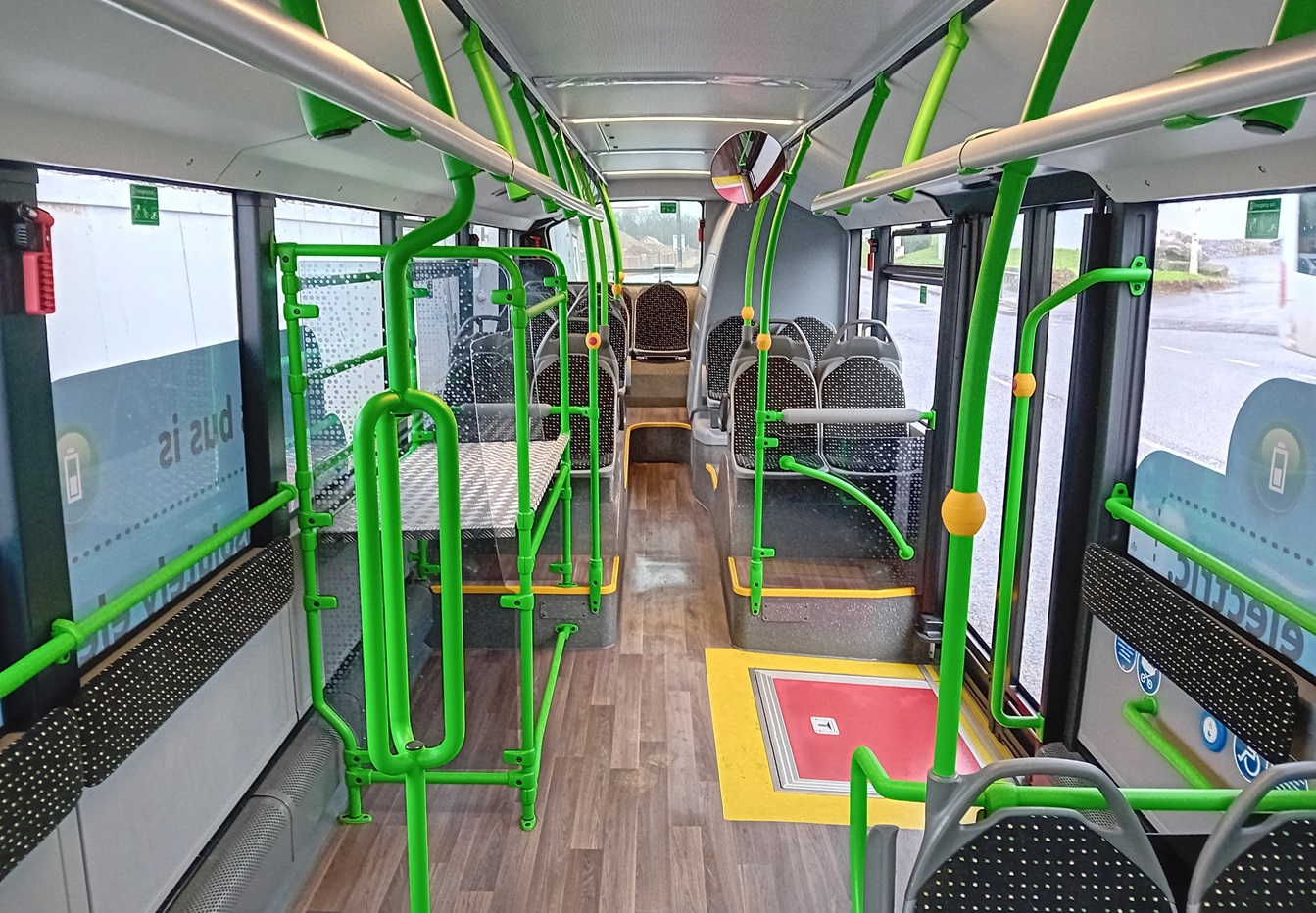
Adrian notes that second, third and fourth of those iterations can be easily interchanged within the vehicle at a time of battery replacement. That is by design; an up to 20-year operating life is expected for the eCitaro and an ability to upgrade the energy storage at a planned midpoint battery change is favourable.
He points also to the Transdev Blazefield deliveries as illustrating how the eCitaro can be configured for a premium niche. Those are the first members of the Citaro platform to be fitted with Kiel seats, and Jens notes that there is much else on them that capitalises on the user experience proposition.
Notably, the eCitaro is compliant as standard with General Safety Regulation 2 requirements. While not mandated in the UK, the EU-mandated scheme is included because of certification of the model under the European Community Whole Vehicle Type Approval mechanism.
That results in multiple additional safety features. Most noticeable from the driver’s perspective is Sideguard Assist 2. It utilises radar sensors on the vehicle flanks to monitor vulnerable road users.
Each A-pillar on the Bristol Airport pair has an orange triangle that illuminates when a risk on its side is detected. The warning escalates to vibration of the driver’s seat if not acted upon. Frontguard Assist works in a similar way.
Bristol Airport has not specified a camera monitoring system (CMS) in lieu of rear-view mirrors, although the eCitaro orders for Transdev Blazefield are CMS equipped. When fitted, the orange warning triangles are moved to the CMS displays.
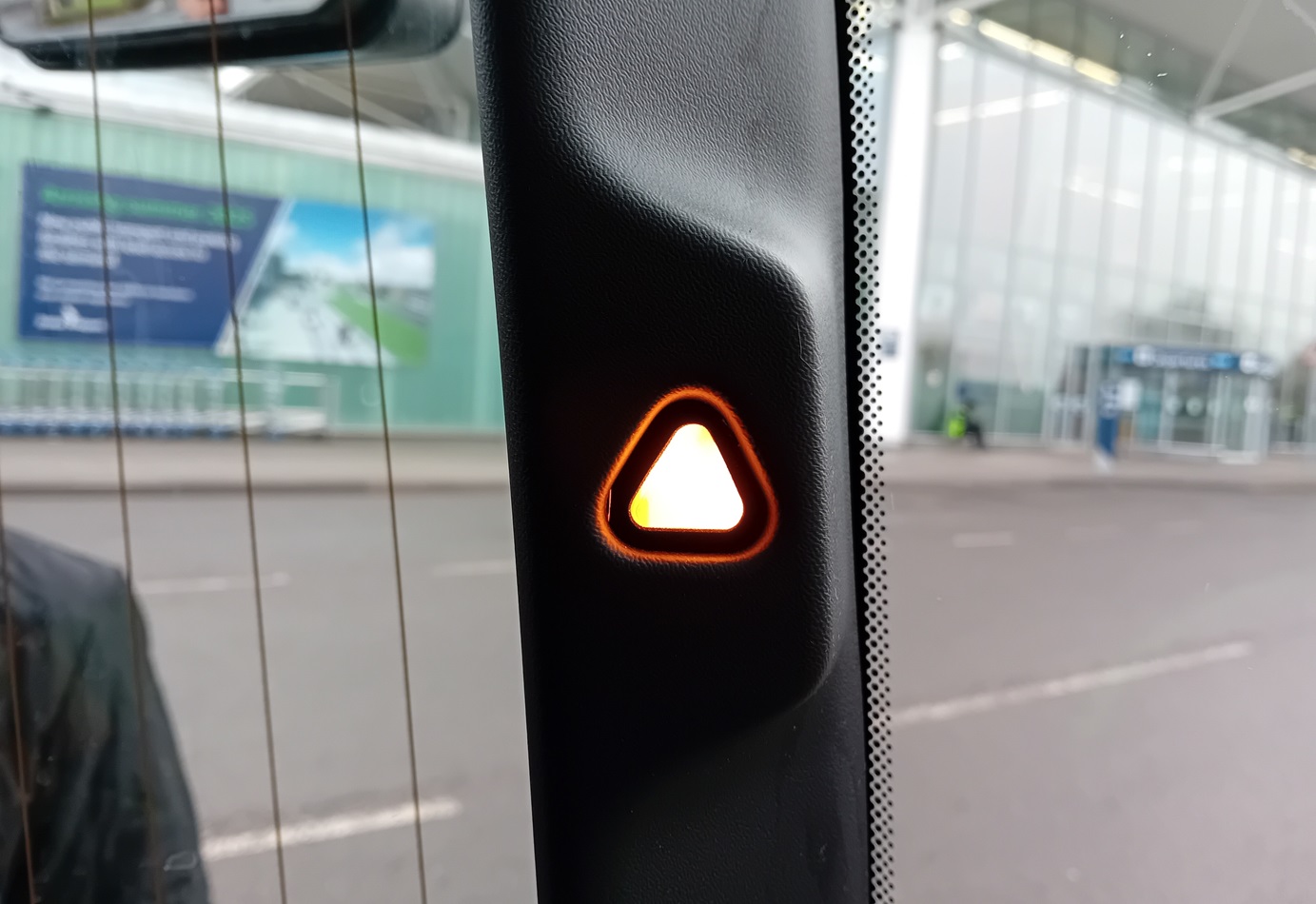
Drivers’ thumbs-up for Mercedes-Benz eCitaro
Paul notes that drivers prefer the battery-electric experience to diesel, although at the start, close attention was paid to the eCitaros’ state of charge. That proved to be over-cautious, and the operating approach means that they are easily capable of what is required.
“The additional weight over a diesel is noticeable on roundabouts but the buses are smooth and have good acceleration,” he continues. The eCitaro cab area is purposely almost identical to that of a diesel Citaro and so Bristol Airport did not specifically train drivers on the battery-electrics.
“But our staff are good; they quickly learned handling techniques to maximise efficiency. The regeneration display on the dash is important to that.”
Paul was speaking soon after the period of cold weather during early January. He observed an increase in energy usage over those days as heating requirements ramped up, but there was no effect on the operation of the buses.
They have saloon air-conditioning combined with a CO2 heat pump to minimise energy consumption. An alternative approach to heating and cooling is available that lacks the heat pump, but UK buyers are advised that the combined system is optimal. A third variant, for hot climates, is also offered, but its capabilities exceed what is required here.
Wider Citaro platform’s UK renaissance
That the Citaro and eCitaro are positioned by Daimler Buses UK as premium offerings is a continuation of an established strategy, but perhaps more significant about the business currently being done by the importer in bus is how it is once more active and pushing hard in that field.
“Has the market for electric buses settled? Not yet,” Jens says. “But we are not in a hurry. Our business model focuses on the long-term. Our priority is service, support and training.”
To that end, Tewkesbury-based partner Arthur Spriggs and Sons brought the eCitaro within its service and support umbrella for Daimler Buses UK during 2024.
It looks after the Bristol Airport examples; maintenance and repair are handled on site at the airport, and they are taken to Tewkesbury for other work. Significant investment has also been made at the vehicle supplier’s Coventry base to support battery-electric.
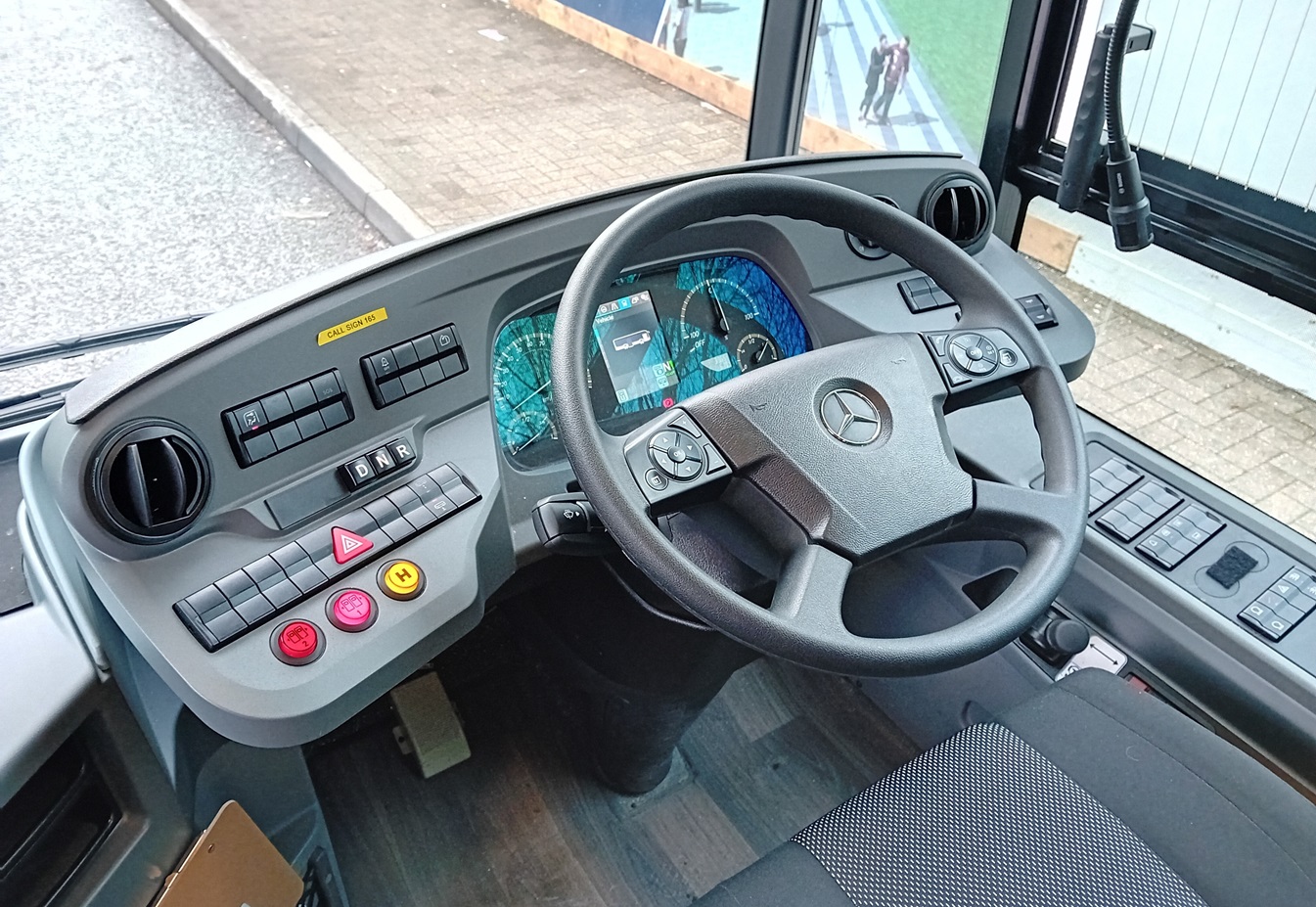
Further buyers of the eCitaro are expected to be named over coming months, while interest in the diesel Citaro – including the mild hybrid variant – remains promising. “We are pleasantly surprised at how many buses Adrian is selling, which is showing us that we have many loyal customers in that market,” Jens continues.
Competing with some other manufacturers on a straight market share basis is not where the eCitaro sits, he adds. Increasing interest among some local authorities in premium bus service products may also bear fruit. “We are aware we are in a niche, but there is certainly a place for the eCitaro and Citaro in the market.”
On diesel, the mild hybrid Citaro – where recaptured energy held in supercapacitors relieves engine load when moving away from rest – remains a worthwhile product, Adrian and Jens agree. It has an on-cost of around £12,000 above a standard diesel, but that brings up to an 8% fuel consumption saving. A new hybrid demonstrator will arrive with Daimler Buses UK this year.
When coupled to the eCitaro’s growing traction and a reinvigorated movement behind those products at the importer, the prospects are once again strong.





















